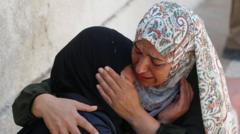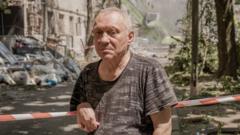As Israel intensifies military action against Iran, the regime, led by Ayatollah Ali Khamenei, grapples with internal discontent and an economic crisis, leading experts to compare its state to the Soviet Union pre-collapse.
Iran's Revolutionary Path: A Nation at a Crossroads

Iran's Revolutionary Path: A Nation at a Crossroads
The Iranian regime faces unparalleled challenges amid rising internal dissent and external threats, prompting questions about its survival.
In an unprecedented moment, the Islamic Republic of Iran, established 46 years ago, finds itself fundamentally challenged, with its leadership struggling to maintain authority amid worsening circumstances. The country has seen a surge of unpopularity surrounding its government, as it invests heavily in a controversial nuclear program and continues to support militant groups throughout the region, all while the economy crumbles.
The 86-year-old Ayatollah Ali Khamenei remains at the helm, having served for over three decades as the guardian of the revolution. Despite his reputation for being risk-averse, the supreme leader's grip on power appears increasingly tenuous in a society brimming with aspirations and youthful energy. Recent developments have amplified the regime's vulnerabilities.
Israel's aggressive military operations have targeted critical infrastructure, including the Natanz nuclear enrichment site, resulting in significant casualties, including the deaths of prominent generals and nuclear scientists. Reports indicate at least 224 fatalities in Iran, predominantly among civilians, as ongoing hostilities ripple through the population, leading many to flee the capital.
Karim Sadjadpour, a noted expert on Iran, referred to the current political landscape as resembling "a rotten tooth waiting to be plucked," akin to the latter years of the Soviet Union. Khamenei faces his gravest challenges yet, amid speculation about the regime's longevity.
Recalling prior turning points, such as the intense protests that emerged after the 2009 elections, Khamenei has shown an unyielding resolve against dissent. That year, the streets of Tehran reverberated with cries for change, met with brutal crackdowns on demonstrators, many of whom suffered grave consequences.
As the situation in Iran unfolds, observers worldwide will be watching closely to understand whether the Islamic Republic will adapt, endure, or ultimately unravel in the face of relentless pressure both domestically and internationally.





















